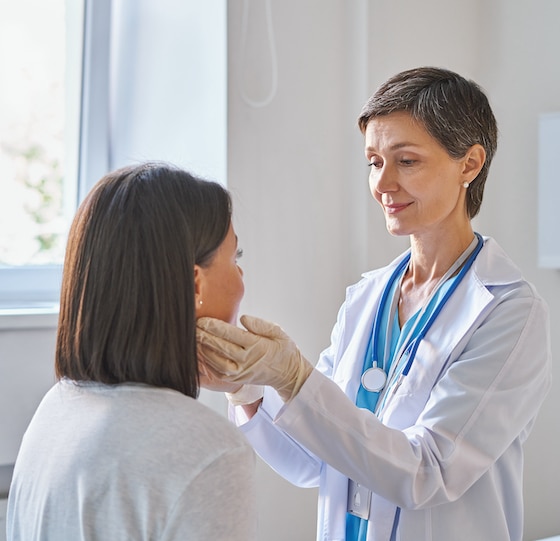Eczema
Eczema CLINICAL RESEARCH STUDIES
Atopic dermatitis, also known as eczema, is an itchy, red rash often associated with allergies. It commonly begins in the first year of life. The rash frequently appears in skin crease areas such as the elbows, knees, and wrists. It often affects the ankles, hands, feet, and face as well.
The skin is usually dry and scaly, and red bumps may appear. The skin can become raw or weepy when it is scratched, and skin thickening may develop in areas of chronic involvement. Affected skin may also be prone to bacterial and viral infections.
Treatment Options for Eczema
Treatment options for eczema continue to evolve, and each of our eczema studies offer unique treatment opportunities for patients with mild to extremely severe reactions. Recent eczema studies have given researchers more information about this disease, which is leading to a better understanding of the ailment and new treatment options.
There are currently a variety of eczema studies available at our center for patients with mild to severe atopic dermatitis. The studies we offer include treatments such as:
- Biologics, complicated molecules that are manufactured within a living organism
- Topical gel
- Oral medication designed to help decrease extremely itchy skin involved with eczema
Our clinical research studies involve medications to treat these symptoms at the forefront of current medicine and are provided at absolutely no cost, with no insurance needed to enrolled patients. Patients may also be reimbursed for time and travel and will receive care from physicians affiliated with AllerVie Clinical Research.
Learn About Eczema from AllerVie Health
Learn MoreSteps to Participation
If you are interested in participating in an AllerVie clinical research study, you can expect the following:
Why AllerVie Clinical Research?
We are passionate about clinical research and paving the way for new and increasingly effective treatment options to help people live in freedom. Our patient-centered approach is founded on the partnership between patient and provider. With us, you get your own personalized team of experts in your disease with direct access to the study physician investigator.
Meet Our Team of Experts
Visit allervie.comFrequently Asked Questions
Clinical research is a branch of healthcare science that determines the safety and effectiveness of medications, devices, diagnostic products and treatment regimens intended for human use. These may be used for prevention, treatment, diagnosis or for relieving symptoms of a disease. Carefully conducted clinical research studies are the safest and fastest way to find treatments that work in people and new ways to improve health. Research studies are conducted according to a plan called a protocol. A protocol describes what types of patients may enter the study including schedules of tests and procedures, drugs, dosages, length of study, and outcomes that will be measured.
Clinical research is conducted for a variety of reasons, including to see if a new drug or device is safe and effective for people to use, to compare existing treatments to determine which is better, or to study different ways to use standard (approved) treatments, so they will be more effective, easier to use, and/or decrease side effects. Clinical research helps us learn how to best extend treatments to a different population, such as children, by learning its efficacy on the new group.
Patient safety is our top concern when conducting clinical research. To protect the rights and welfare of clinical research participants, U.S. Federal Agencies including the Food and Drug Administration (FDA) & the National Institutes of Health (NIH) oversee much of the medical research and the U.S. Institutional Review Boards (IRBs) oversee the centers where clinical research studies are conducted. IRBs review and approve study protocols to ensure that a clinical trial is ethical and that volunteers’ rights are protected.
A participant in a clinical trial has access to the IRB that is overseeing the research and access to a volunteer advocate, the physician, and the staff conducting the trial.
There are many benefits to participating in clinical research, including access to potentially new research treatments, expert medical care for the condition being studied (as our investigators are generally specialists in the disease area being studied), and the ability to help others by contributing to medical research and treatment advances. Additionally, financial reimbursement for time and travel is often available to those who participate.
While there are many benefits to participation in clinical research, there are also some potential risks. These include the potential that the treatment may not be effective, participation in the trial may be demanding and time-consuming, and there may be unpleasant, serious, or even life-threatening side effects resulting from the treatment. You should weigh both the potential risks as well as the benefits and potential for positive outcomes when considering participating in clinical research. Often, the possible outcomes of cutting-edge therapies and the results they can deliver greatly outweigh the possible risks.
Be a Part of the Future of Medicine
AllerVie Clinical Research partners with patients, physicians, and pharmaceutical sponsors to contribute to the development of innovative, new therapies that connect patients and physicians to the future of medicine generating hope and cures for today and tomorrow.




